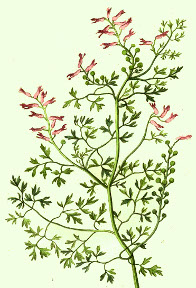|
 Fumitory Fumitory
Fumaria
officinalis
Fumitory acquired the name Earth smoke partly because it looks smoky from a distance and partly because it was burned to expel evil spirits. It was also smoked to treat disorders of the head. In the Middle Ages, fumitory was believed to be propagated by a smoke rising from the earth rather than from seed, perhaps because it reseeds itself prolifically. It is a bitter herb and for millennia has been used to as a spring tonic, liver tonic, to get rid of worms and other parasites (we see a medical equivalent of evil spirits here), expel gallstones, and so on. Fumitory is related to the poppy, and some say that its continued use has a narcotic result. However, the information we find shows it to be mildly stimulant instead, and in traditional herbalism it is not used as a sedative.
Fumitory is generally considered a Saturn herb, likely because of its connection to fumes rising from underground, i.e., the Underworld. But Eliphas Levi notes fumitory as an appropriate herb to be used in rituals performed on a Wednesday, which would be Mercury, and Agrippa associates it with "Falling Vulture," that is, the fixed star Vega, and considers it to be a Mercury herb because of its "mixed nature." The flowers make a yellow dye on wool. This magic herb is also known as Earth smoke, beggary, fumus, Fumus
Terrae, fume-of-the-earth, vapor, wax dolls, and capa de reina.
|
Fumitory,
chopped
1 oz. $4.25

Uses
in Witchcraft & Magic:
Exorcism
Purification
Saturn/Earth Herb
© 2012-2024 Alchemy Works; No
reproduction without permission
|